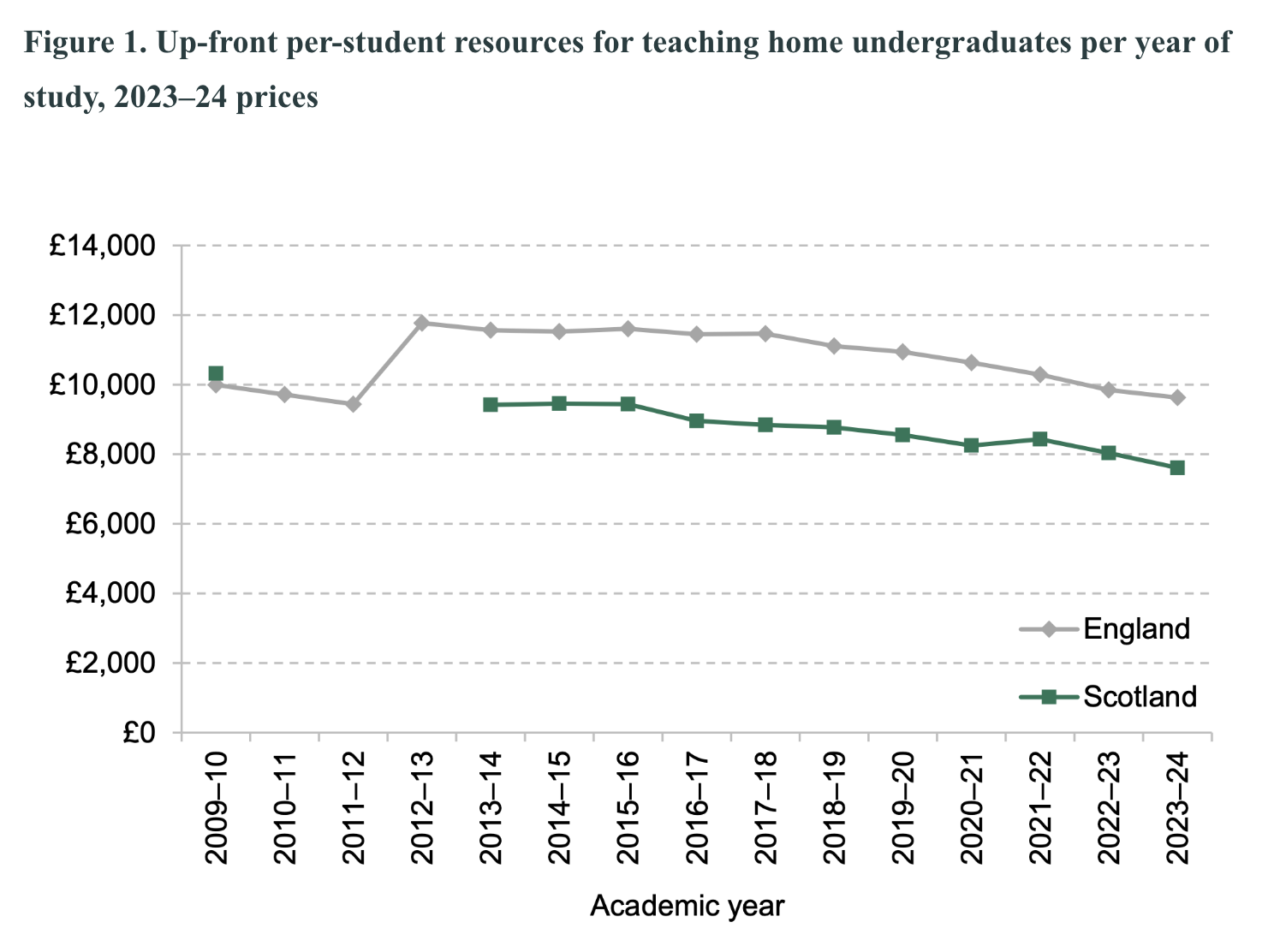Scotland’s HE settlement means “inescapably hard” choices for universities
Jim is an Associate Editor (SUs) at Wonkhe
Tags
Especially because, unlike in England, that threshold is still going up by inflation – which means next year a 13.5 per cent increase in April 2024 will see it rise to £31,395 – so more debt plus fewer repaying it will mean more of it written off.
That’s money that normally comes from the UK budget – but interestingly, Treasury policy says that where a devolved administration wishes to offer more generous terms for stuff like this, then the excess over that implied by adopting broadly similar terms for that programme (and therefore broadly comparable costs) must be met by the devolved administration.
Add all that up (along with some other accounting twiddles) and while the UK government covers most of the damage, the Scottish Government theoretically has to find a chunk of the difference too.
That may partly explain what was a pretty brutal budget settlement for Scottish higher education announced by Finance secretary Shona Robison on Tuesday.
Universities Scotland makes it a 5.9 per cent cash cut to university resource budgets, which mainly cover the cost of teaching students from Scotland.
The £48.5 million is partly offset by a 4.7 per cent boost to the university capital budget, which covers research, innovation and buildings – but even so, a £32.3m net cut in an era of high inflation will lead to what Iain Gillespie, Convener of Universities Scotland and Principal of the University of Dundee, will mean some “inescapably hard” choices for universities:
Universities are facing serious headwinds in international student recruitment, which means the assumed reliance on cross-subsidy from international fees to compensate for cuts to public funding is likely to leave universities exposed on multiple fronts.
There’s a similar sized cut for FE budgets too.
Buried in the annexes of the equality and fairer Scotland statement, the government fesses up that there is a “significant risk” that the reduction in the HE resource budget will increase competition for remaining university places, which “could disadvantage” learners from socio-economically disadvantaged areas with lower prior attainment.
But don’t worry…
…continued monitoring of widening access requirements on institutions will aim to mitigate this risk.
Last week the IFS said that funding for teaching had already fallen by 19 per cent since 2013-14, hovering as it does at around £2,000 less per student than is available for an English university teaching an England-domiciled undergraduate in 2023–24.

The usual mutterings accompany much of the press coverage about the return of tuition fees – but curiously, there’s never much muttering about the “typical” four year length of a Scottish undergraduate degree, which actually takes to the total to around 5 per cent higher than funding for teaching an English undergraduate.
If the international PGT downturn is real and the SNP remain in power, those “inescapably hard” choices are going to mean more course cuts. Could moving to a three year norm – getting graduates into the labour market faster in the process – be a less controversial option?


Scottish HE funding is inescapably broken and is leading to some very poor recruitment choices but moving to a 3-year degree doesn’t ring true as a less controversial solution. The Scottish 4-year degree isn’t just the 3-year degree stretched out – at 1st and 2nd year students study electives alongside their main degree subject for curriculum breadth and the majority of degrees are offered as flexible degrees. That is, if you take the required courses in 1st and 2nd year you have a choice of which degree programme to continue with in honours and this is a huge selling point of the Scottish system. This flexibility is currently under attack at some institutions because of over-recruitment leading to reduced elective choices but the principle remains.
Additionally, a high proportion of Scottish students choose to come to university after their Highers rather than Advanced Highers (somewhat equivalent to AS level over A level) when they are still 17. Moving to a 3-year degree would also necessitate many more students staying in school for Advanced Highers. As first year lead, I think this would be fantastic as the extra year of maturation makes a big difference but it wouldn’t solve the funding crisis, it would just shuffle the deckchairs about.
From a political perspective, I think it would be unlikely that the SNP would choose to change the distinctive Scottish HE offering that has a long history to align with English HE as a solution. From a workload perspective, if I am asked to convert our 4-year degree into a 3-year degree, I am going to walk up a munro and never come back.
Any (re)introduction of tuition fees would definitely get people talking about the value of the four-year degree (students/parents would want to know that the fourth year vs England was worth paying for). But as Emily says, cutting the degree down would require more funding for schools so wouldn’t necessarily save the government much money
The four year degree is the best thing we have in Scottish Universities. It offers breadth and the opportunity to change paths. The idea that ‘getting graduates into the labour market faster’ is what universities -and education – are for is soul-crushingly miserable.